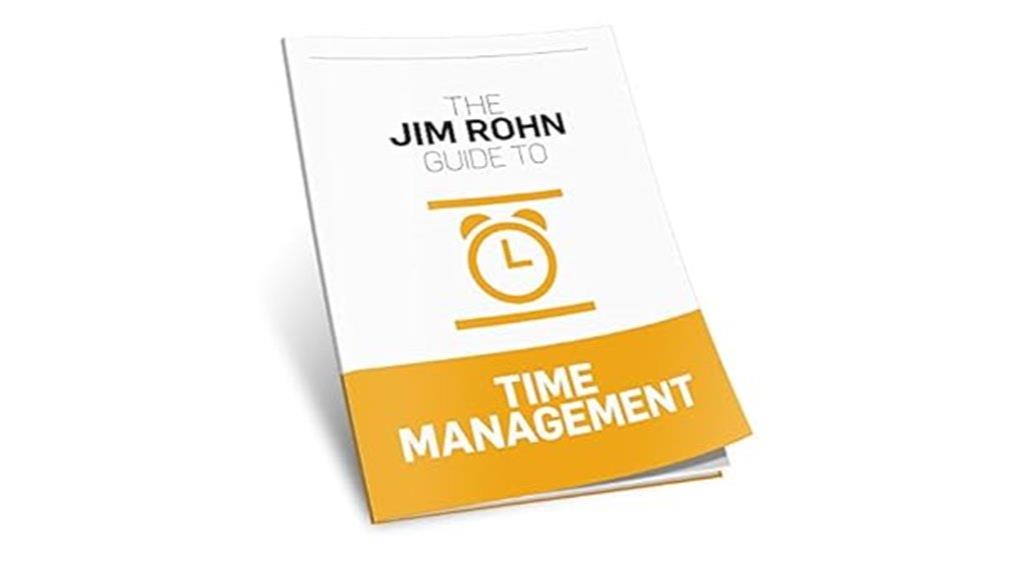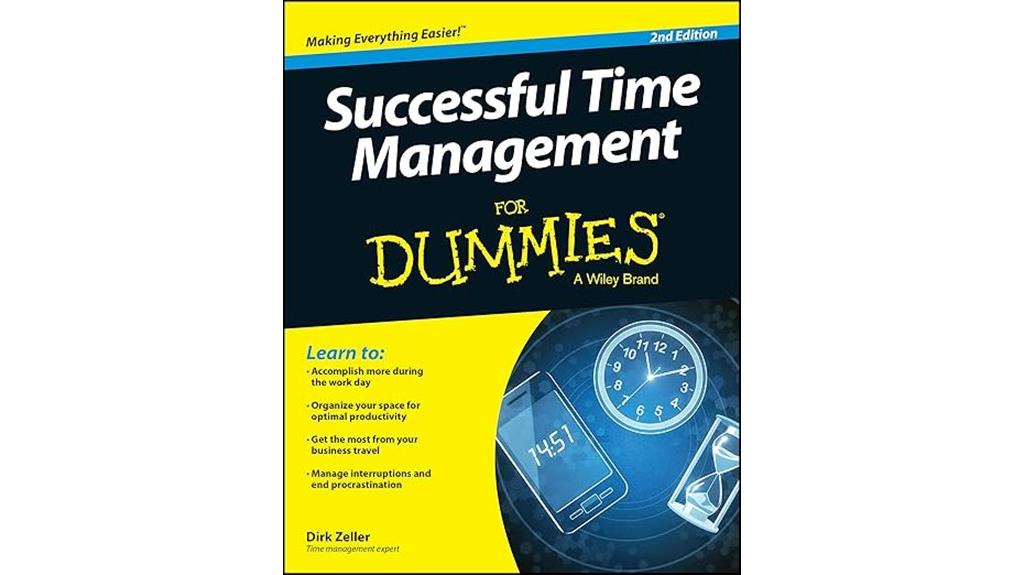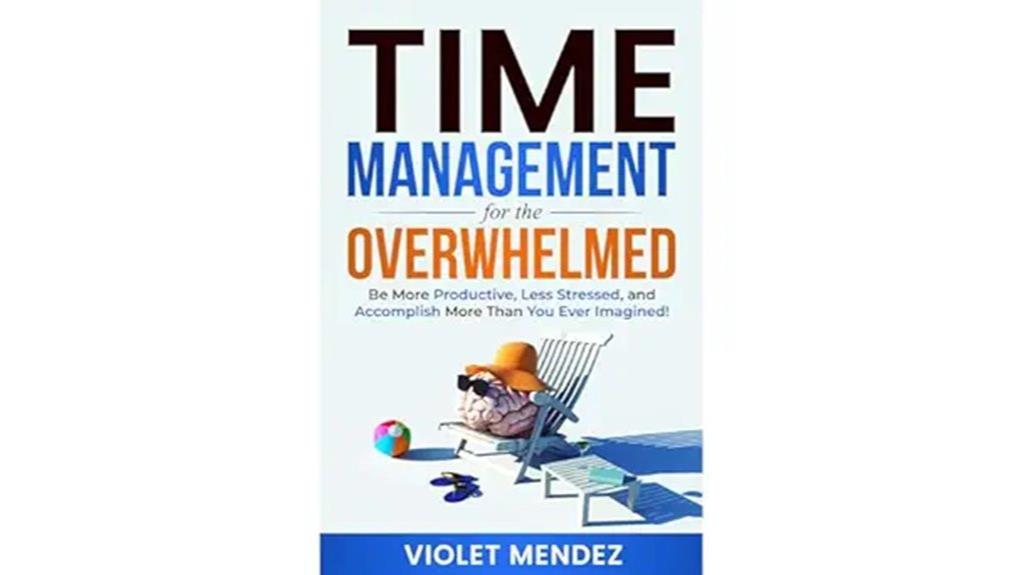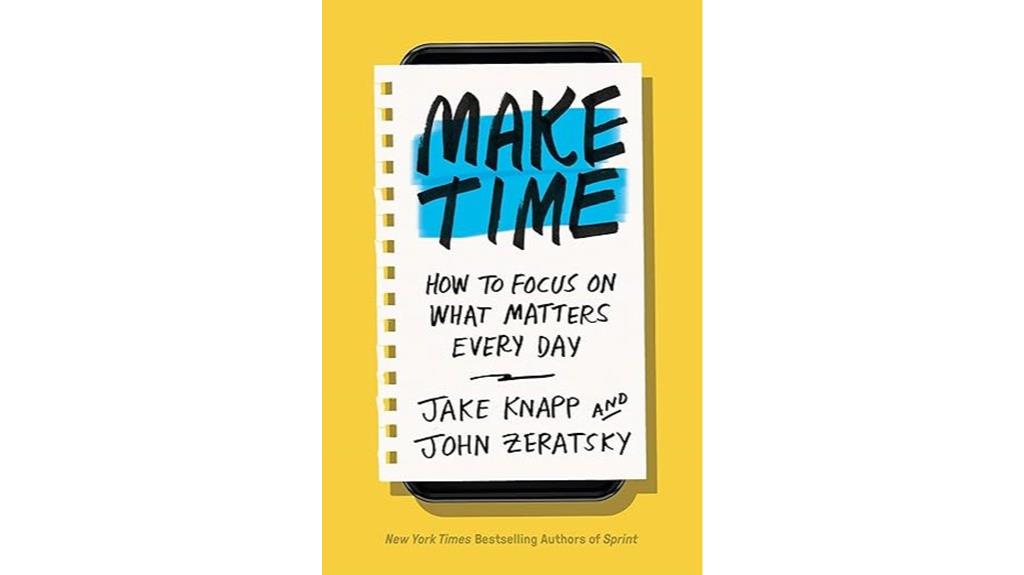If you want to boost your productivity in 2025, I recommend these five top books: *No B.S. Time Management for Entrepreneurs* for straightforward strategies, *The Jim Rohn Guide to Time Management* for quick motivation, *Successful Time Management For Dummies* for all-encompassing tips, *Time Management for the Overwhelmed* to handle stress and routines, and *Make Time* for mindset shifts and focus techniques. Keep going, and you’ll discover practical methods to take control of your schedule today.
Key Takeaways
- *No B.S. Time Management for Entrepreneurs* offers practical, no-nonsense techniques like prioritization and discipline for immediate productivity gains.
- *Successful Time Management For Dummies* provides comprehensive strategies, templates, and tools suitable for entrepreneurs seeking detailed guidance.
- *Time Management for the Overwhelmed* focuses on stress reduction, building routines, and mindful habits to enhance overall productivity.
- *Make Time* emphasizes mindset shifts, focus techniques, and digital distraction elimination to improve daily focus and work intentionally.
- All five books combine practical tips, actionable strategies, and motivational insights tailored to entrepreneurs aiming to boost productivity in 2025.
No B.S. Time Management for Entrepreneurs

If you’re an entrepreneur overwhelmed by distractions and looking for straightforward strategies to boost your productivity, No B.S. Time Management for Entrepreneurs is a game-changer. I appreciate Dan Kennedy’s no-nonsense approach—he cuts through the fluff and emphasizes discipline, focus, and high-value activities. His techniques, like time blocking and protecting work periods, are simple yet powerful. Kennedy stresses understanding your time’s true worth and eliminating time wasters like emails and unnecessary meetings. This book pushes you to prioritize wealth-building tasks and develop a disciplined work ethic. If you’re ready to take control of your time and maximize your results, Kennedy’s approach delivers actionable, proven strategies.
Best For: entrepreneurs seeking straightforward, disciplined time management strategies to boost productivity and focus on high-value activities.
Pros:
- Emphasizes practical, proven techniques like time blocking and distraction elimination.
- Focuses on developing discipline and a strong work ethic to maximize wealth.
- Offers clear, no-nonsense guidance that can be easily implemented by busy entrepreneurs.
Cons:
- The aggressive tone and extreme examples may be off-putting for some readers.
- Lacks detailed emphasis on systems or tools as time-saving mechanisms.
- Primarily geared toward entrepreneurs, making it less suitable for traditional employees or beginners.
The Jim Rohn Guide to Time Management

The Jim Rohn Guide to Time Management stands out as an ideal resource for entrepreneurs seeking quick, practical reminders to develop better habits. It offers simple, clear lessons drawn from Rohn’s teachings, perfect for busy minds needing a boost. The small, portable booklet makes it easy to review daily, reinforcing key concepts without overwhelming. Many users, including young learners, find it accessible and motivating. Though some see it as basic or brief, its straightforward approach helps create positive routines and mindset shifts. If you want a quick, impactful reminder to stay focused and productive, this guide can be a valuable tool in your arsenal.
Best For: individuals of all ages, especially busy entrepreneurs and young learners, seeking quick, practical reminders to develop better time management habits.
Pros:
- Easy-to-read, concise chapters make it accessible for all ages.
- Portable format allows for regular review and reinforcement of key concepts.
- Praises for practicality and straightforward approach, motivating positive routines.
Cons:
- Small and basic, which may lead some to overlook its value.
- May be perceived as too simple or lacking in depth for those seeking comprehensive strategies.
- Some users consider it more of a quick reminder than a detailed guide.
Successful Time Management For Dummies

Looking to sharpen your time management skills with practical strategies? “Successful Time Management For Dummies” stands out as an excellent choice for entrepreneurs seeking a thorough, hands-on guide. This book offers valuable tips, tools, and habits to improve productivity across work, relationships, and personal goals. While some readers find the latest edition a bit vague or repetitive, overall, it’s praised for its all-encompassing nature and practical advice. Author Dirk Zeller’s own success story inspires, showing how effective time management can transform your life. Many users report that applying the book’s principles helps them stay organized and achieve a better work-life balance.
Best For: entrepreneurs and professionals seeking a comprehensive, practical guide to improve their time management skills and achieve better work-life balance.
Pros:
- Offers practical tips, tools, and habits applicable across various areas of life and work.
- Written by Dirk Zeller, whose success story serves as an inspiring model for effective time management.
- Well-organized and thorough, providing valuable guidance despite some minor criticisms.
Cons:
- The latest edition has been criticized for being vague and repetitive.
- Lacks a specific daily time management template, which some users find inconvenient.
- Some readers feel certain topics are irrelevant or the content could be clearer.
Time Management for the Overwhelmed

For overwhelmed entrepreneurs struggling to keep up with mounting responsibilities, “Time Management for the Overwhelmed” offers practical, easy-to-apply strategies that can make a real difference. Violet Mendez’s book provides clear techniques to prioritize tasks, overcome procrastination, and manage stress effectively. It emphasizes building habits like consistent wake-up routines, tackling tough tasks first, and taking regular breaks. I found the relatable analogies and scientific insights especially helpful, making complex concepts easy to implement. This guide isn’t just about managing time; it’s about improving overall well-being while boosting productivity. It’s a must-read for anyone feeling swamped and looking for simple, proven methods to regain control.
Best For: overwhelmed entrepreneurs and professionals seeking practical, easy-to-implement strategies to improve time management, reduce stress, and boost overall well-being.
Pros:
- Provides clear, actionable techniques backed by scientific research and relatable analogies.
- Focuses on building sustainable habits like consistent routines and task prioritization.
- Addresses holistic well-being, including stress management, mindfulness, and physical health.
Cons:
- Some techniques may seem basic or intuitive to advanced users, offering more revision than new insights.
- The book’s brevity might leave readers wanting more in-depth strategies or personalized guidance.
- Requires consistent effort and discipline to fully implement the recommended habits and see lasting results.
Make Time: How to Focus on What Matters Every Day

If you’re an entrepreneur struggling to prioritize your daily tasks amid constant distractions, Make Time offers practical strategies to help you focus on what truly matters. The authors, Jake Knapp and John Zeratsky, use a friendly, humorous tone, making complex ideas easy to grasp. Their approach emphasizes choosing a daily Highlight, turning off distractions, and reflecting on progress. The book’s simple, actionable tips—like signing out of social media or focusing during dedicated periods—have helped many shift from just staying busy to working intentionally. It’s a quick, engaging read that can transform your mindset and boost your productivity every day.
Best For: entrepreneurs and busy professionals seeking practical, easy-to-implement strategies to improve focus, prioritize meaningful work, and reduce digital distractions.
Pros:
- Engaging, humorous, and conversational writing style makes complex ideas accessible.
- Provides simple, actionable techniques like signing out of social media and identifying a daily Highlight.
- Focuses on mindset shifts that promote sustainable productivity and intentional living.
Cons:
- Some readers find the emphasis on evolutionary psychology and caveman analogies overly simplistic or questionable.
- The suggestion to write on paper may be inconvenient for those who prefer digital tools.
- Certain scientific claims and analogies may lack strong evidence, leading to skepticism about their applicability.
Factors to Consider When Choosing Time Management Books for Entrepreneurs

When selecting a time management book, I focus on how practical and actionable the advice is for my daily tasks. I also consider whether the author’s style resonates with me and if the content suits my experience level. Ultimately, I look for books that offer useful tools and strategies I can easily implement to improve productivity.
Practical Application Focus
Choosing the right time management book for entrepreneurs means focusing on resources that deliver concrete, actionable strategies I can implement immediately. I look for books that include practical exercises, templates, or step-by-step guides, making it easier to apply concepts directly to my daily routine. It’s essential that the methods are results-oriented, helping me track progress toward increased productivity or time saved. I also prioritize books that offer adaptable strategies suited to a busy schedule, like time blocking or distraction management, so I can stay on track even with a packed calendar. Finally, I prefer titles that balance theoretical insights with practical tips, ensuring I can translate concepts into tangible habits that produce measurable results quickly and consistently.
Author’s Style and Tone
Ever wondered how an author’s tone can make or break your motivation to stick with a time management strategy? The style and tone of a book greatly affect how engaging and effective it feels. Some authors take a direct, no-nonsense approach, emphasizing discipline and action, which suits entrepreneurs craving aggressive results. Others use a conversational or humorous tone, making complex ideas easier to grasp and apply. The tone can be highly motivational and assertive or gentle and reflective, shaping how you relate to the advice. Choosing a style that matches your personality and learning preferences increases your chances of adopting and maintaining new habits. When the tone resonates with you, staying committed to your time management goals becomes much more natural and sustainable.
Target Audience Relevance
How do you guarantee a time management book truly fits your entrepreneurial journey? First, check if it’s tailored specifically for entrepreneurs or designed for a general audience. Entrepreneurs face unique pressures like juggling growth, client demands, and personal life, so your chosen book should address these challenges. Look for practical tools and techniques you can apply quickly in a fast-paced environment. Consider whether the content matches your business stage—whether you’re a startup founder or an established entrepreneur seeking efficiency. Lastly, evaluate the tone and style—do they motivate you or provide straightforward guidance? Ensuring the book aligns with your specific needs and mindset guarantees it’ll be a valuable resource in boosting your productivity in 2025.
Depth of Content
When evaluating a time management book for your entrepreneurial journey, considering its depth of content is vital. The depth determines how thorough and detailed the strategies are, directly impacting how well you can apply them. Shallow books might offer quick tips or motivational quotes but often lack the systematic frameworks needed for long-term success. In contrast, more complete books include step-by-step methods, research-backed techniques, and practical tools that can lead to measurable improvements. However, keep in mind that deeper content usually requires more time and effort to master. Your choice should depend on your familiarity with time management concepts and whether you prefer practical strategies or more theoretical insights. Selecting a book with appropriate depth ensures you gain actionable guidance aligned with your current needs.
Implementation Tools Provided
Choosing a time management book with effective implementation tools can make a significant difference in applying its concepts to your entrepreneurial routine. I look for books that include practical resources like templates, checklists, and action plans, which help me immediately put ideas into practice. Tools such as time blocking schedules and prioritized task lists turn advice into daily habits, saving me time and effort. Exercises and prompts keep me engaged, allowing me to reinforce new behaviors and track progress. Clear, step-by-step guides or frameworks make learning easier, especially when my schedule is busy. Additionally, digital or printable resources provide flexibility, letting me customize and revisit tools whenever needed. These implementation aids are essential for transforming theory into tangible results.
Frequently Asked Questions
How Do These Books Address Digital Distractions for Entrepreneurs?
These books tackle digital distractions by teaching me practical strategies like setting boundaries, prioritizing tasks, and using technology intentionally. They emphasize the importance of scheduled tech breaks and focus blocks, helping me resist constant notifications. I’ve learned to create a distraction-free environment, turn off non-essential alerts, and use apps intentionally. Applying these tips boosts my productivity, keeps me focused, and prevents digital chaos from derailing my entrepreneurial goals.
Are There Specific Time Management Strategies for Different Industries?
Absolutely, I tailor my time management strategies based on my industry. For example, in tech, I prioritize rapid project iterations and flexible schedules, while in consulting, I focus on client meetings and deadlines. I find customizing my approach helps me stay efficient and aligned with industry demands. Whether it’s setting boundaries or using specific tools, adapting my methods makes a real difference in managing my time effectively.
Do These Books Include Actionable Exercises or Only Theory?
I’ve found that many top time management books actually include practical exercises alongside theory. They aim to help you implement concepts immediately, not just understand them. For example, I’ve used techniques from these books that involved specific action steps, like prioritization drills or time-blocking plans. So, yes, most of these books are designed to be practical, giving you tools you can apply right away to boost your productivity.
How Can Entrepreneurs Implement These Time Management Tips With a Busy Schedule?
I understand busy schedules can make implementation tricky, but I stay committed by carving out small blocks of time daily for key tasks. I prioritize my to-do list and use tools like timers to stay focused. I also set clear boundaries to protect my work time. These simple, consistent habits help me stay on track without feeling overwhelmed, and I find I get more done in less time.
Are There Recommended Follow-Up Resources or Courses Linked to These Books?
Yes, I recommend exploring online courses and workshops related to these books. Many authors offer webinars, mastermind groups, or coaching programs that deepen your understanding and application. Additionally, websites like Coursera and Udemy have time management courses tailored for entrepreneurs. I find that engaging with these resources helps me stay accountable and refine my skills, ultimately boosting my productivity and growth.
Conclusion
Think of these books as your compass, guiding you through the maze of entrepreneurship. Each page is a stepping stone, helping you carve out your path amid chaos. As you turn these pages, envision yourself steering a ship through stormy seas, steady and focused. With the right time management tools, you’ll navigate confidently toward success, ensuring your days aren’t lost to distractions but filled with purpose. Your journey to productivity starts now—are you ready to set sail?









